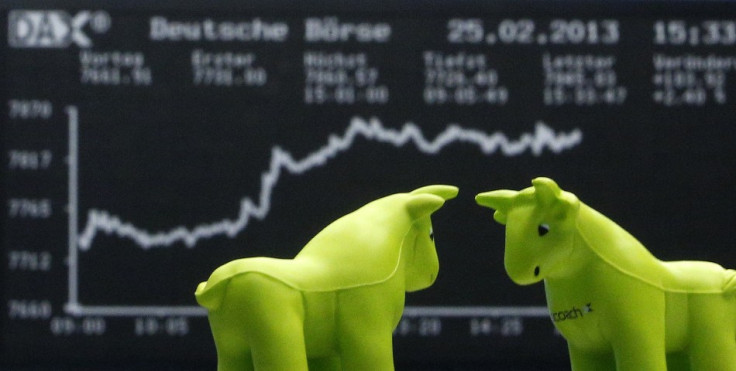European Stocks Drop as Italy Concerns Mount

European stocks declined in the opening minutes of trade as investors considered the ongoing political deadlock in Italy ahead of European Central Bank's policy meet.
The FTSEurofirst 300 index, tracking the region's top shares, fell 0.2 percent to 1,202.03. The UK's FTSE 100 and Germany's DAX were down 0.2 percent each.
France's CAC-40 was down 0.7 percent. Italy's FTSE MIB and Spain's IBEX dipped 0.5 percent each.
The single currency remained weak against the dollar, trading at about $1.27.
As Cyprus concerns appear to ease, Italian political developments have taken centre-stage as the country struggles to bring the deadlocked political parties to a consensus. Italy's President Giorgio Napolitano has brought together a team of mediators - dubbed the '10 wise men'- to try and break the impasse.
But analysts remain sceptical on the effectiveness of the mediators as political parties continue to remain at odds, raising concerns of a fresh election this year.
Markets sentiments were upbeat in the previous session after media reports suggested that AT&T and Verizon were considering a takeover proposal for Vodafone. However, Verizon has denied the speculation overnight.
Investors are awaiting the flash euro area consumer price index set for release during the day and the European Central Bank's policy meet scheduled to take place later this week.
Asian markets had remained mixed earlier, as investors remained cautious ahead of Bank of Japan's policy meet, amid speculations of aggressive monetary easing measures.
The Nikkei average index ended 3 percent higher to 12362.2 while South Korea's KOSPI was down 0.2 percent to 1983.2. Australia's S&P/ASX 200 was down 0.6 percent to 4957.7.
In China, the Shanghai Composite Index fell 0.3 percent to 2220.1 towards close, while Hong Kong's Hang Seng was down 0.2 percent to 22325.2.
Speculations on BoJ's policy decisions remained in focus in Japan as the central bank began its first meeting under the new governor Haruhiko Kuroda. Investors remain optimistic that BoJ will look to take up bold economy-boosting measures, which could include an increase in bond purchases and buying longer-term bonds.
The Japanese government, under Prime Minister Shinzo Abe, is looking to shore up the country's lagging economy with bold stimulus measures. He had pressured the central bank to raise its inflation target to 2 percent and take up unlimited easing measures.
But sending a mixed signal on possible policy decisions, this week Abe said that the central bank may not be able to meet the inflation goal in the two years as indicated earlier, reports the Financial Times. He also said that BoJ should not pursue the target "at all costs".
Chinese market sentiments picked up after an official and a private non-manufacturing Purchasing Managers Index (PMI) showed that the country's service sector picked up in March. The official PMI rose to 55.6 in March from 54.5 in February while HSBC's index rose to rose to 54.3 from 52.1.
© Copyright IBTimes 2025. All rights reserved.



















